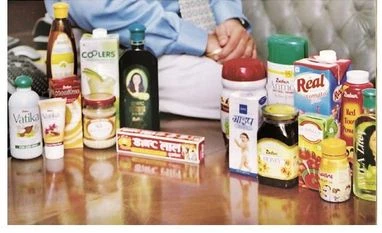Homegrown FMCG major Dabur India Ltd on Tuesday reported a 4.64 per cent rise in consolidated net profit at Rs 505.31 crore for the September quarter backed by a double-digit volume growth in domestic market.
The company had posted a consolidated net profit of Rs 482.86 crore in the July-September quarter a year ago, Dabur India said in a BSE filing.
Revenue from operations for the reported quarter was up 11.98 per cent to Rs 2,817.58 crore as against Rs 2,516.04 crore in the corresponding quarter of the previous fiscal.
This was helped by "an underlying industry-leading volume growth of 10 per cent in the domestic FMCG business," said Dabur India a post-earnings statement.
"Dabur India reported its fifth successive quarter of strong double-digit growth despite growing inflationary pressures impacting consumer sentiments," it added.
All verticals of the business, from Ayurvedic medicines to hair care, oral care, homecare and food & beverages, reported growth in sales and market share, it noted.
Also Read
Commenting on the results, Dabur India CEO Mohit Malhotra said: "While the COVID-19 fears have largely receded with the vaccination drive gathering pace and mobility improving, the operating environment remained challenging with unprecedented inflation impacting consumer sentiments in the run-up to the festive season.
"Our strategic business transformation exercise last year helped us successfully address the emerging challenges and deliver a healthy topline growth despite the tough macroeconomic conditions."
Malhotra said the company has undertaken calibrated price increases and sharpened its focus on cost control to mitigate the impact.
"We continue to focus on rolling out consumer-relevant innovations, coupled with heavy investments behind our Power Brands and distribution expansion strategy, to deliver strong, sustainable and profitable growth, said Malhotra.
Dabur India's total expenses in Q2 FY22 were up 12.65 per cent at Rs 2,268.47 crore as against Rs 2,013.73 crore in the year-ago period.
Revenue from the consumer care business segment was up 7.68 per cent to Rs 2,387.45 crore as against Rs 2,217.16 crore in the year-ago period.
Food business revenue was up 44.01 per cent to Rs 369.90 crore as compared with Rs 256.85 crore in the year-ago period.
Revenue from the retail business stood at Rs 18.27 crore, up 67.46 per cent from Rs 10.91 crore in the corresponding period of the previous year.
While revenue from other segments was up 39.28 per cent to Rs 34.50 crore as against Rs 24.77 crore in Q2 FY21.
Dabur continues to invest in expanding its rural footprint and strengthening its digital capabilities, which bore a rich dividend in the July-September quarter.
Rural demand outpaced the urban demand and e-commerce accounted for 7 per cent of its domestic sales in the quarter.
We are investing ahead of the curve in expanding our rural footprint. We have surpassed our rural coverage target of 80,000 villages 18 months ahead of schedule and are now hovering around 83,500 villages, Malhotra added.
While, on a constant currency basis, Dabur's international business reported a growth of 13.8 per cent during the second quarter. This was led by a 25 per cent growth in Sub-Saharan Africa, 17.8 per cent in Egypt and 12.8 per cent in MENA (Middle East & North Africa).
Its Namaste group business, which Dabur had acquired in 2011, reported a 16.7 per cent growth.
The company's board in a meeting held on Tuesday approved an interim dividend of 250 per cent, which is Rs 2.50 per equity share having a face value of Re 1/- each for the financial year 2021-22, Dabur India said in a separate filing to BSE.
Moreover, the board has also approved the enhancement in the limit of NCDs (Non-Convertible Debentures) to be issued on a private placement basis from the existing limit of Rs 250 crore to Rs 500 crore.
"The enhanced limit shall enable the company to issue said NCDs from time to time in various tranches on private placement basis," it added.
Shares of Dabur India Ltd closed at Rs 598.30 apiece on BSE, up 0.05 per cent over previous close.
(Only the headline and picture of this report may have been reworked by the Business Standard staff; the rest of the content is auto-generated from a syndicated feed.)
)